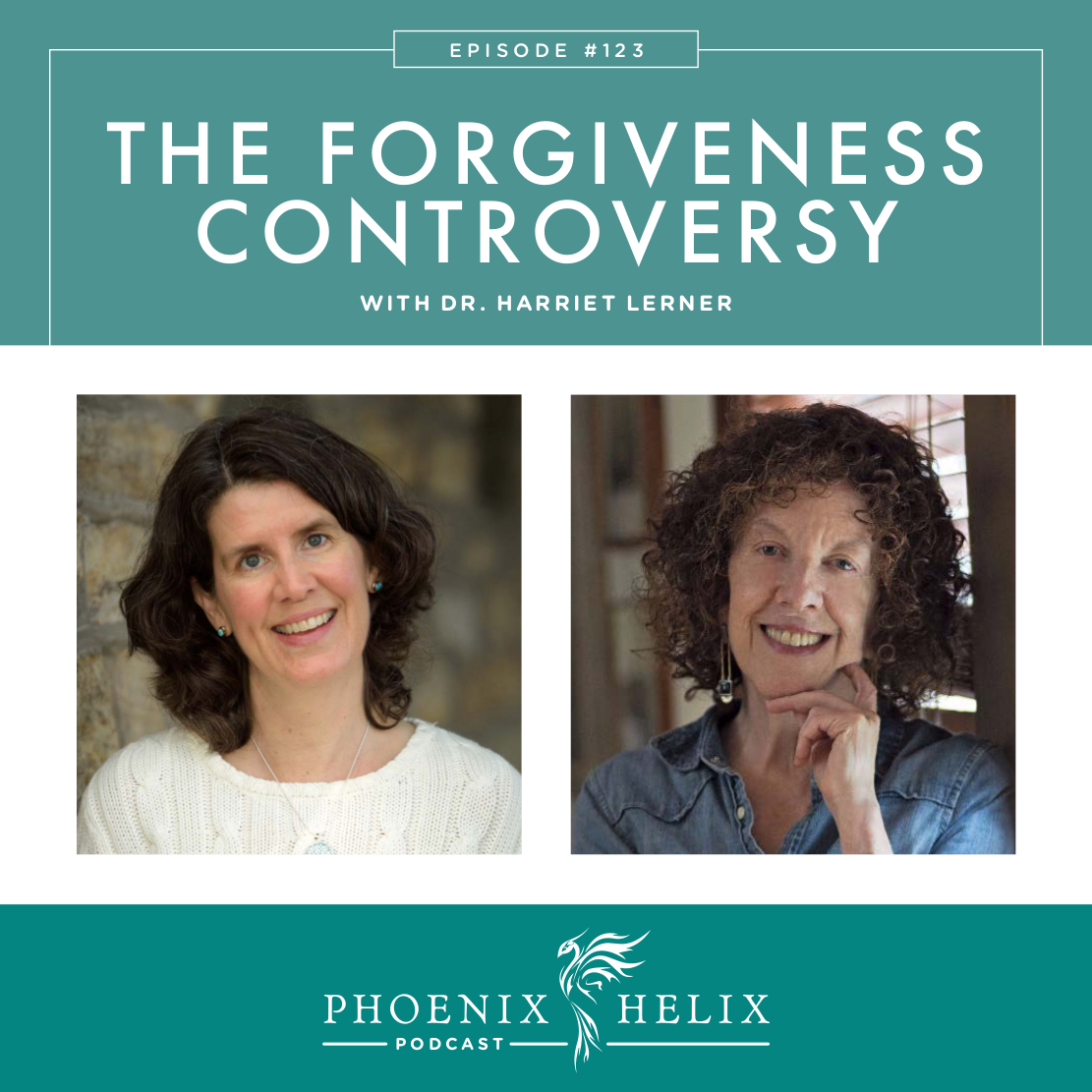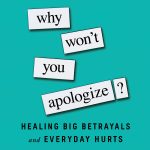Forgiveness and Health
There’s some compelling research that suggests the inability to forgive leads to negative health consequences, and the practice of forgiveness can have health benefits. When it comes to small injustices, this seems relatively easy to do. But what if you have experienced something that you find unforgivable? Is forgiveness a requirement for healing? The pressure to forgive can feel like getting re-victimized all over again. However, there is another way of looking at this research. My guest is Dr. Harriet Lerner, a clinical psychologist and bestselling author. Her most recent book is called Why Won’t You Apologize? Healing Big Betrayals and Everyday Hurts. Dr. Lerner has a different perspective on forgiveness – that the positive health outcomes are associated with letting go of chronic anger, bitterness, resentment, and pain. She sees forgiveness as a choice, not a requirement for healing.
Listen to the Show
- Subscribe to my podcast through your favorite podcast app: iTunes, Stitcher, Google, TuneIn, Spotify, Amazon, etc.
- You can also listen to the episode right here through the player below, and if you subscribe to my newsletter you’ll get notified of future episodes.
Podcast: Play in new window | Download
Show Notes
- Intro & Meet Dr. Lerner (0:00)
- Dr. Harriet Lerner is a clinical psychologist and bestselling author. She’s written 12 books, which have been translated into 35 languages. Her New York Times bestseller, The Dance of Anger, sold over 3 million copies. Her most recent book is called Why Won’t You Apologize? Healing Big Betrayals and Everyday Hurts.
- Thank You to Our Podcast Sponsor: ShopAIP (2:28)
- Today, I want to highlight some of their new products in the snack category: Wild Made Veggie Go’s, Jack’s Paleo Kitchen Cookies, and New Primal Beef Thins. When we’re on a healing diet, we want the bulk of our food to be home-made and nutrient-dense, but convenient snacks like this are great for travel, emergencies, and also the occasional treat which helps make this lifestyle sustainable.
- An online store, where everything sold is compliant with the elimination-phase of the Paleo Autoimmune Protocol. ShopAIP sells a wide variety of products, including protein bars, AIP-friendly spice blends, cooking and baking ingredients, snacks, non-toxic skincare, and more.
- If you’re a first-time customer, use the code PHOENIX for 10% off your order. Purchase here.
- Blog Updates (4:35)
- Just a reminder to everyone that on the weeks between podcasts, I write articles on my blog. If you don’t want to miss out, subscribe to my weekly newsletter. Recent articles include 3 Myths About the Mind-Body Connection and The Difference Between Collagen and Gelatin.
- The Importance of Apologies (5:42)
- We’re all human. We all unwitting hurt others and are hurt by others. The ability to give a true apology is an essential life skill. Done right, apologies can be deeply healing. Done wrong (or not at all) they can complicate or end relationships.
- A heartfelt apology is a gift not only to the hurt party but also to ourselves and the relationship. It tells the hurt party that we care about their feelings and are capable of taking responsibility for our actions. It also validates the hurt party’s experience and makes forgiveness much easier. For us, our self-respect and success in relationships rests on our ability to see ourselves objectively and see how our behavior impacts others.
- Yet apologies are hard! Bad ones are much more common than good ones.
- Top 3 Ways to Muck Up an Apology (9:06)
- “I’m sorry, but….” – this is where we immediately jump to the excuse, bypassing a true apology altogether. (For a good apology, keep your “but” out of it.)
- “I’m sorry you feel that way” or “I’m sorry you were offended.” – When we say this we aren’t actually apologizing for what we did at all. Instead, we are judging the person for their reaction. (For a good apology, focus on your own behavior.)
- “I already apologized a million times! Let’s drop this already!” – This is where we see the apology as a free pass to forgiveness, and we don’t want to listen to the hurt we caused. (For a good apology, put your defensiveness on the shelf and listen to the hurt party.)
- What Makes Apologies Difficult (12:40)
- It’s relatively easy to apologize for small things and much more difficult to apologize for large things. In fact, the more serious the offense, the less likely an authentic apology will happen.
- Humans are wired for defensiveness. That means, when someone approaches us with their hurt and anger, we listen defensively. We listen for the things we don’t agree with and start to object and argue about those.
- Instead, try listening to understand. Listen for what you can agree with. What is the essence of the hurt? What did you truly do wrong? Where can you take responsibility and authentically apologize?
- Save any objections for a separate conversation. For large apologies, there are often multiple conversations as the work is done to mend the relationship. In future conversations, you can begin by validating their perspective and then share where your point of view might differ. After sharing that, ask the hurt party how they feel about those differences, and take the time to listen again.
- Listening is what gives an apology meaning.
- To build your own apology skills, practice first with smaller apologies which helps prepare you for the larger ones.
- The Connection Between Apologies & Forgiveness (20:23)
- It’s often easier to forgive someone who has offered a true, heartfelt apology, listened to our feelings, showed that they care, and taken full responsibility for their actions.
- By contrast, when someone refuses to apologize – or even reverses blame – forgiveness becomes very difficult.
- Why Some People Can’t Apologize (22:01)
- The greater the harm, the more likely the perpetrator is to wrap themselves in denial and defensiveness and refuse to take responsibility.
- To offer a heartfelt apology for a serious offense requires a solid platform of self-worth that allows the person to see their behavior clearly and take responsibility, without becoming overwhelmed by worthlessness and shame.
- The non-apologizer walks on a tightrope of defensiveness over a huge canyon of low self-esteem. They cannot handle admitting the truth to themselves or anyone else.
- People can only be as honest with us as they are with themselves. The human capacity for denial is amazing.
- 3 Myths About Forgiveness (24:13)
- #1 – You need to forgive because it’s the only path to healing.
- #2 – You are a less loving, whole, and spiritual person if you don’t forgive.
- #3 – You are at greater risk for physical and emotional problems if you don’t forgive.
- None of these things are true. There are huge cultural pressures to forgive, but there are alternative paths to healing. Forgiveness is a choice, and you are worthy no matter which choice you make.
- It’s also never our job to push another person to forgive. That can actually be re-traumatizing for that person.
- Thank You to our Podcast Sponsor – Paleo on the Go (30:19)
- A frozen meal delivery service, 100% of their menu is compliant with the elimination phase of the paleo autoimmune protocol (AIP). They have over 5o items, including entrees, side dishes, broth, AIP-friendly bacon, and desserts.
- Use the code PHOENIX for 10% off your first order.
- Defining Forgiveness (31:30)
- Forgiveness means different things to different people, and it usually falls into 2 categories: (1) The personal practice of letting go of the corrosive anger, rumination, and resentment. (2) The spiritual practice of forgiveness where the burden is laid down, and the perpetrator is also wished well.
- The forgiveness research conflates these two definitions together. However, the personal practice of letting go doesn’t need to involve forgiveness at all, and Dr. Lerner believes it’s the letting go that brings the health benefits. Forgiveness is one path, but it’s not the only path to healing.
- Health Consequences of Non-Forgiveness (36:54)
- The research is often presented simplistically, as if it’s a guarantee that chronic, negative emotions will lead to chronic health issues. That isn’t going to be the case for everyone. Our bodies are more complex than that, and individuals respond to stressors differently.
- That said, if our stress response is constantly being triggered by angry, obsessive ruminations about the person who hurt us, that isn’t optimal for living a happy life, and it can impact our health, both emotionally and physically.
- Resource: Forgiveness Research Summary.
- Dr. Lerner’s Personal Forgiveness Philosophy (39:10)
- Dr. Lerner isn’t anti-forgiveness. If it’s part of someone’s spirituality or worldview and they have the goal of forgiveness, that can be a beautiful thing.
- For her personally, she agrees with this quote by Janis Abrahms Spring: “You don’t restore your humanity when you forgive an unapologetic offender; he restores his humanity when he works to earn your forgiveness.”
- For Dr. Lerner, when people have hurt her and are non-apologetic, she can get to a place of empathy and compassion, seeing their behavior in the context of a complex life. She also doesn’t define people by their worst deeds, and this broader perspective can be helpful in the art of letting go. But she isn’t inspired to forgive under those circumstances. Instead, forgiveness is something she strives for within the context of relationships where the other person cares about her feelings and making amends.
- So, when it comes to forgiveness, she supports people to decide for themselves under what circumstances they want the goal of forgiveness vs. learning to let go, and each person defines what those words mean to them.
- The Spectrum of Forgiveness (42:34)
- Forgiveness doesn’t have to be an all or nothing thing. You can forgive someone 1% or 100% or anywhere in between.
- Should You Confront the Offender? (46:15)
- Dr. Lerner doesn’t believe confrontations ever go well. So, her first tip is to think of it as a conversation.
- Next she encourages people to look at the pros and cons of opening a conversation with an unapologetic offender. What is your goal?
- It’s important to understand the offender will probably never apologize. The more serious the harm done, the less likely an apology will be forthcoming, no matter how well you communicate. If you desperately want an apology, not getting one can be re-traumatizing.
- However, if your goal is to stand your ground and state your truth to that person, regardless of their response, that’s a potentially worthwhile goal.
- The important thing is to protect yourself. Having a conversation with the offender is not a requirement for healing.
- Advice for Letting Go (52:00)
- First, it’s important to know that rumination is normal – it’s what our brains do. So you’re not faulty if you find yourself obsessing about the harm someone has done to you.
- Although it’s normal, it’s not good for us, and we need to work to overcome it any way we can. There are many techniques that can be helpful:
- Therapy
- Meditation
- Medication
- Religious & Spiritual Practices
- Journaling
- Art Therapy
- Yoga
- Deep Breathing
- Being Useful to Others – this is one of the greatest antidotes to despair.
- Gaining a Broader Perspective – The perpetrator’s history isn’t an excuse, but it may provide context that sometimes makes letting go easier.
- Self-Forgiveness (55:58)
- The key to self-forgiveness is self-compassion. Just like non-apologetic offenders don’t have a foundation of self-worth to take responsibility for their actions, this lack can make it equally challenging to forgive ourselves.
- We’re all flawed and imperfect human beings, and we do need to look at ourselves objectively and see our own vulnerabilities and limitations. Working on those is important, but personal growth is a self-loving practice. It doesn’t flourish in an atmosphere of self-devaluation.
- Self-forgiveness can be especially hard for women, because culturally there are a lot of messages that women aren’t “enough”, and women often feel guilty when they can’t do everything perfectly.
- Resources:
- Outro (59:35)
- You can keep up with Dr. Lerner and her work through her website. She’s written 12 books, which have been translated into 35 languages. Her most recent book is called Why Won’t You Apologize? Healing Big Betrayals and Everyday Hurts.
- Eileen (your podcast host) is the author of multiple books, written to help people thrive with autoimmune disease. Learn more on the Books Page.
- If you like this podcast, follow or subscribe through your favorite podcast app. You can also subscribe to Eileen’s biweekly newsletter.
- Check out the entire archive of podcast episodes.
You May Also Be Interested In
Spreading the Word
If you like the podcast, please leave a positive review in iTunes. It would mean the world to me, and also helps others find the podcast. Here are some quick instructions using your iPhone:
- If you are already subscribed to my podcast: (1) Click the purple podcast icon. (2) At the bottom of the screen, click Library. (3) At the top of the screen, click Shows. (4) Click the Phoenix Helix podcast image. (5) Scroll down the page, and you’ll see Ratings and Reviews. Scroll down a little bit more and click on Write a Review. This will bring up the review screen. Tap 5 stars (if you love the podcast), and then click in the title box, and it will bring up the keyboard. Enter a title and short review. (6) Click Send in the upper right corner. (7) Thank you! Positive reviews give the podcast a higher search ranking in iTunes, helping people find it and letting them know it’s a quality podcast and worth their time to listen.
- If you haven’t subscribed to my podcast: (1) Click the purple podcast icon. (2) In the lower right corner, click the magnifying class. (3) Type Phoenix Helix in the search box. (4) Click the podcast cover in the Show list. (5) If you’d like to subscribe, click the + sign at the top of the screen. (6) To write a review, scroll down the page, and you’ll see Ratings and Reviews. Scroll down a little bit more and click on Write a Review. This will bring up the review screen. Tap 5 stars (if you love the podcast), and then click in the title box, and it will bring up the keyboard. Enter a title and short review. (7) Click Send in the upper right corner. (8) Thank you! Positive reviews give the podcast a higher search ranking in iTunes, helping people find it and letting them know it’s a quality podcast and worth their time to listen.









There are some great points here!
Like forgiving partially, feeling empathy or seeing a bigger picture as options instead of “full forgiveness” towards people who are not remorseful. And Dr Harriet’s experience that confrontations seldom go well.
Good to consider also, like she says, that apologies or acknowledgement will not be forthcoming from a person who in admitting to certain facts would have to live with an intolerable definition of themselves. That to protect yourself is the most important thing. And that you can be retraumatized by opening a conversation with an offender who won’t acknowledge or apologize for what has happened.
Catharina, thanks so much taking the time to comment. I agree with you, and I loved this interview. Dr. Lerner offers people a much broader perspective on forgiveness and multiple paths to healing, which is so much more helpful than the often too-simple conversation that surrounds forgiveness.